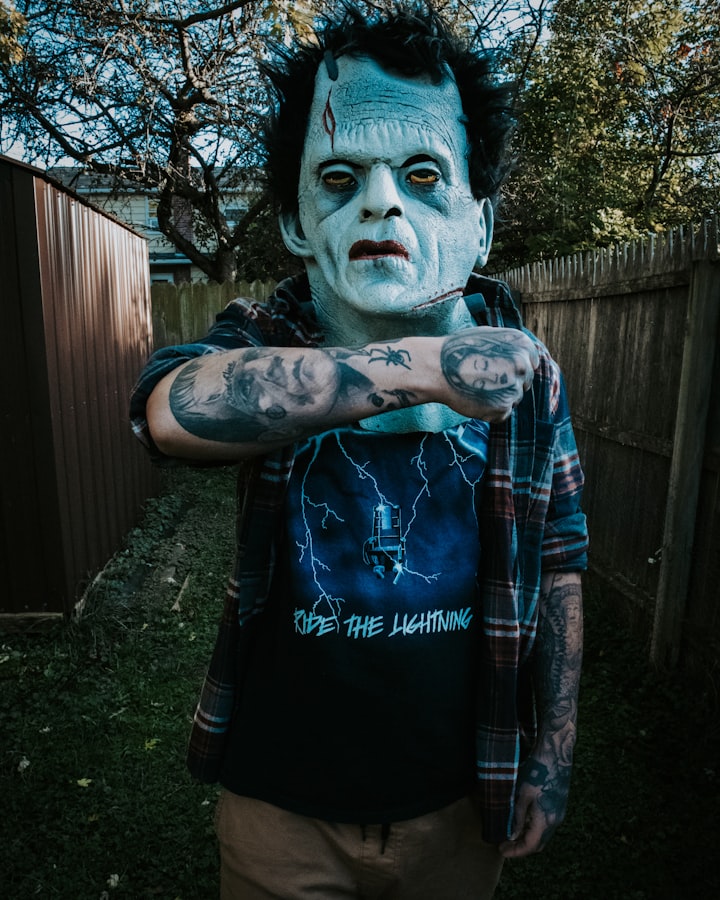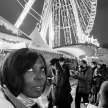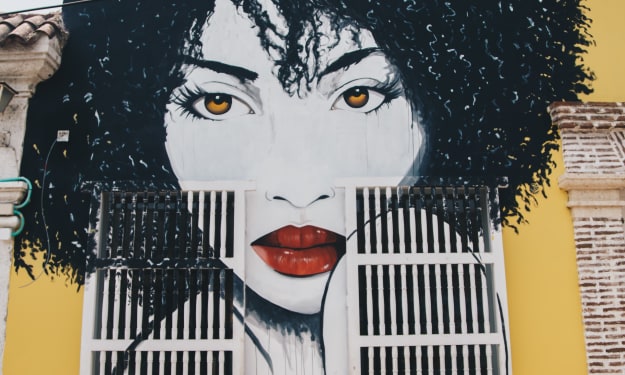Mary Shelley and Frankenstein
A young woman, an old soul, a sad and fearsome story.

If walls could talk and sit awhile with this young girl of long ago, as her mind conjured up the monster which we have come to know as Frankenstein. How could someone so young, born in a time when women's rights were almost non-existent, and her life plagued with one misfortune after another, dream up such a story as Frankenstein?

First, we need to understand who Mary really was!
Mary Wollstonecraft Shelley (30 August 1797 – 1 February 1851) was an English novelist who wrote the Gothic novel Frankenstein; or, The Modern Prometheus (1818), which is considered an early example of science fiction and one of her best-known works. She also edited and promoted the works of her husband, the Romantic poet and philosopher Percy Bysshe Shelley. Her father was the political philosopher William Godwin and her mother was the philosopher and women's rights advocate Mary Wollstonecraft.
Mary's mother died less than a fortnight after giving birth to her. She was raised by her father, who provided her with a rich if informal education, encouraging her to adhere to his own anarchist political theories. When she was four, her father married a neighbor, Mary Jane Clairmont, with whom Mary came to have a troubled relationship.
In 1814, Mary began a romance with one of her father's political followers, Percy Bysshe Shelley, who was already married. Together with her stepsister, Claire Clairmont, she and Percy left for France and travelled through Europe. Upon their return to England, Mary was pregnant with Percy's child. Over the next two years, she and Percy faced ostracism, constant debt and the death of their prematurely born daughter. They married in late 1816, after the suicide of Percy Shelley's first wife, Harriet.
In 1816, the couple and Mary's stepsister famously spent a summer with Lord Byron and John William Polidori near Geneva, Switzerland, where Shelley conceived the idea for her novel Frankenstein. The Shelleys left Britain in 1818 for Italy, where their second and third children died before Shelley gave birth to her last and only surviving child, Percy Florence Shelley. In 1822, her husband drowned when his sailing boat sank during a storm near Viareggio. A year later, Shelley returned to England and from then on devoted herself to the upbringing of her son and a career as a professional author. The last decade of her life was dogged by illness, most likely caused by the brain tumor which killed her at age 53.
Oh Mary! Mary my child! Now I understand how a tender mind as yours could imagine the making of such a man. What heartaches, pain and agony must have awakened the need for something unto which to focus all the pain and rage that must have been too hard for your heart to bear. Our walls hearts broke for you so many times. I wish we could have told you. Still, we cheer you on. Your strength and your resolve to never give up, has been an inspiration for us walls.
Frankenstein Castle is in southern Hesse, Germany, on the spurs of the Odenwald mountain range close to the southern outskirts of Darmstadt. It is one of many historic castles along the Hessian Bergstraße Route, also famous for its vineyards and its mild climate.
Frankenstein tells the story of Victor Frankenstein, a young scientist who creates a sapient creature in an unorthodox scientific experiment. Shelley started writing the story when she was 18, and the first edition was published anonymously in London on 1 January 1818, when she was 20. Her name first appeared in the second edition, which was published in Paris in 1821.
Shelley travelled through Europe in 1815, moving along the river Rhine in Germany, and stopping in Gernsheim, not far away from Frankenstein Castle, where, two centuries before, an alchemist had engaged in experiments. She then journeyed to the region of Geneva, Switzerland, where much of the story takes place. Galvanism (a term invented by the late 18th-century physicist and chemist Alessandro Volta to refer to the generation of electric current by chemical action), and occult ideas were topics of conversation for her companions, particularly for her lover and future husband Percy B. Shelley. In 1816 Mary, Percy and Lord Byron had a competition to see who could write the best horror story. After thinking for days, Shelley was inspired to write Frankenstein after imagining a scientist who created life and was horrified by what he had made.
Though Frankenstein is infused with elements of the Gothic novel and the Romantic movement, it is regarded as the first true science-fiction story. In contrast to previous stories with fantastical elements resembling those of later science fiction, the central character "makes a deliberate decision" and "turns to modern experiments in the laboratory" to achieve fantastic results. The novel has had a considerable influence on literature and on popular culture; it has spawned a complete genre of horror stories, films, and plays.
Since the publication of the novel, the name "Frankenstein" has often been used, erroneously, to refer to the monster, rather than to his creator/father.
Wrap your minds around the sheer genius of a nineteen year old young woman who could conjure up such a story within the time that she existed. She, along with many others, Doyle, Byron, Hemingway, Austen, Steinbeck and Atwood, were so far ahead of their time, and their influence has spanned throughout entire generations.
Books are by far my favorite things. Library after library line up books of treasures against our strong and supportive walls, inviting all to sit and read, please. It really makes me sad to see the loss of interest in wholesome and beautifully bound books, hardcovers, softcovers, stapled, whatever they are we are proud to hold them openly displayed for all to peruse and enjoy. I know that modern inventions make it no longer necessary for as many books to be a part of life anymore. I am forever thankful that there will however, always be the faithful few who still will need the comfort and feel of a book in their hands.
Shall we speak a bit about the creature Frankenstein.
From a young age, Victor had a strong desire to understand the world. He was obsessed with studying theories of alchemy, though when he is older, he realizes that such theories are considerably outdated.
Weeks before he leaves for the University of Ingolstadt in Germany, his mother dies of scarlet fever; Victor buries himself in his experiments to deal with the grief. At the university, he excels at chemistry and other sciences, soon developing a secret technique to impart life to non-living matter. He undertakes the creation of a humanoid, but due to the difficulty in replicating the minute parts of the human body, Victor makes the Creature tall, about 8 feet in height, and proportionally large. Despite Victor's selecting its features to be beautiful upon creation, the Creature is instead hideous, with watery white eyes and yellow skin that barely conceals the muscles and blood vessels underneath. Repulsed by his work, Victor flees. While wandering the streets the next day, he meets his childhood friend, Henry Clerval, and takes Clerval back to his apartment, fearful of Clerval's reaction if he sees the monster. However, when Victor returns to his laboratory, the Creature is gone..
Victor falls ill from the experience and is nursed back to health by Clerval. After a four-month recovery, he receives a letter from his father notifying him of the murder of his brother William. Upon arriving in Geneva, Victor sees the Creature near the crime scene and becomes convinced that his creation is responsible. Justine Moritz, William's nanny, is convicted of the crime after William's locket, which contained a miniature portrait of Caroline, is found in her pocket. Victor knows that no one will believe him if he tries to clear Justine's name, and she is hanged. Ravaged by grief and guilt, Victor retreats into the mountains. While he hikes through Mont Blanc's Mer de Glace, he is suddenly approached by the Creature, who pleads for Victor to hear his tale.
Intelligent and articulate, the creature relates his first days of life, living alone in the wilderness. He found that people were afraid of him and hated him due to his appearance, which led him to fear and hide from them. For though he tried to be friendly to people, they were all terrified of him. He was lonely and he wanted a mate. The Creature then swore revenge against all humans. He travelled to Geneva using details from Victor's journal, murdered William, and framed Justine for the crime.
The Creature demands that Victor create a female companion like himself. He argues that as a living being, he has a right to happiness. The Creature promises that he and his mate will vanish into the South American wilderness, never to reappear, if Victor grants his request. Should Victor refuse, the Creature threatens to kill Victor's remaining friends and loved ones and not stop until he completely ruins him. Fearing for his family, Victor reluctantly agrees. The Creature says he will watch over Victor's progress.
Clerval accompanies Victor to England, but they separate, at Victor's insistence, at Perth, Scotland. Victor suspects that the Creature is following him. Working on the female creature on Orkney, he is plagued by premonitions of disaster. He fears that the female will hate the Creature or become more evil than he is. Even more worrying to him is the idea that creating the second creature might lead to the breeding of a race that could plague humankind. He tears apart the unfinished female creature after he sees the Creature, who had indeed followed Victor, watching through a window. The Creature immediately bursts through the door to confront Victor and tries to threaten him into working again, but Victor refuses. The Creature leaves, but gives a final threat: "I will be with you on your wedding night." Victor interprets this as a threat upon his life, believing that the Creature will kill him after he finally becomes happy. Victor sails out to sea to dispose of his instruments, falls asleep in the boat, is unable to return to shore because of changes in the winds, and ends up being blown to the Irish coast. When Victor lands in Ireland, he is arrested for Clerval's murder, as the Creature had strangled Clerval and left the corpse to be found where his creator had arrived. Victor suffers another mental breakdown and wakes to find himself in prison. However, he is shown to be innocent, and after being released, he returns home with his father.
In Geneva, Victor is about to marry Elizabeth and prepares to fight the Creature to the death, arming himself with pistols and a dagger. The night following their wedding, Victor asks Elizabeth to stay in her room while he looks for "the fiend". While Victor searches the house and grounds, the Creature strangles Elizabeth. From the window, Victor sees the Creature, who tauntingly points at Elizabeth's corpse; Victor tries to shoot him, but the Creature escapes. Victor's father, weakened by age and by the death of Elizabeth, dies a few days later.
Seeking revenge, Victor pursues the Creature through Europe, then north into Russia, with his adversary staying ahead of him every step of the way. Eventually, the chase leads to the Arctic Ocean and then on towards the North Pole, and Victor reaches a point where he is within a mile of the Creature, but he collapses from exhaustion and hypothermia before he can find his quarry, allowing the Creature to escape. Eventually the ice around Victor's sledge breaks apart, and the resultant ice floe comes within range of Walton's ship.
Victor dies shortly thereafter, telling Walton, in his last words, to seek "happiness in tranquility and avoid ambition." Walton discovers the Creature on his ship, mourning over Victor's body. The Creature tells Walton that Victor's death has not brought him peace; rather, his crimes have made him even more miserable than Victor ever was. The Creature vows to kill himself so that no one else will ever know of his existence and Walton watches as the Creature drifts away on an ice raft, never to be seen again.
That is Mary's story, so thrilling and entharlling!
These walls find reading and writing such a beautiful undertaking. Enjoy the love of it. It may not bring riches and prosperity, but let it bring beauty, joy and wonderment into the creating or enjoyment of the written or spoken word.
............................................................................................................
This story contains excerpts.
About the Creator
Novel Allen
Every new day is a blank slate. Write something new.






Comments
There are no comments for this story
Be the first to respond and start the conversation.